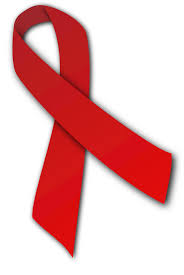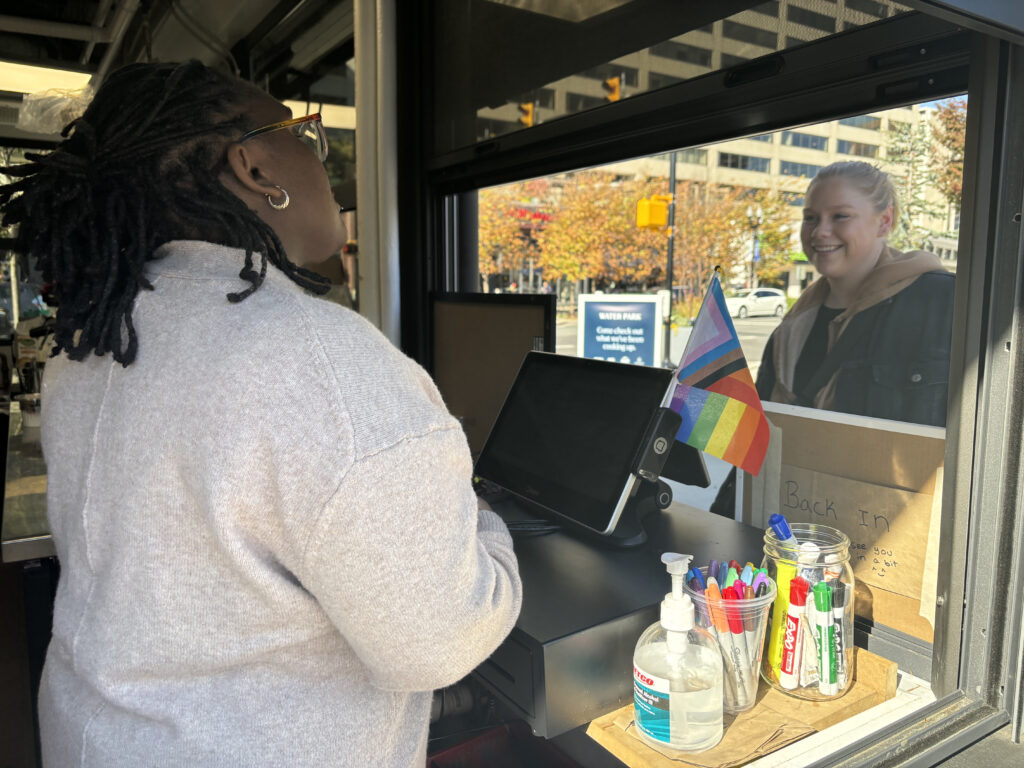“Her mother was doomed to a life full of death/ And so was she/ It was predicted that she would breathe her last breath before 5/ But now/ Here she stands 5 foot 9/ 15 years after her expected demise.” Mary Bowman’s voice did not waver as she spoke of her once predicted death. She gripped the microphone with a defiant vivacity, as tightly as she gripped the audience.
Bowman contracted HIV from her mother at birth, making her one of the three percent of D.C. residents diagnosed with HIV. That number surpasses some Western African countries according to city health officials. Experts estimate the number is more like six percent because of those who do not know they have it.
Bowman’s mother died from AIDS three years after she was born. However, Bowman began writing poetry in high school. Now 22 years old, Bowman writes and performs poetry under the stage name Marie Elaine. Her aim is to help those who face similar struggles.
Bowman was born in the District and grew up in Prince George’s County, Md., where she currently lives with her stepmother in Clinton. Although she discovered that she was HIV Positive in fourth grade, she did not begin sharing her status until a year or two ago.
“I used to be a part of a support group … and part of it is about accepting your status and really learning how to deal with it,” Bowman said. “I was inspired to write a piece, which was my first time talking about my status. And since I got a great response, I just kept writing and trying to share my story and help other people that are walking in my shoes.”
Bowman’s first open mic was Spit Dat! at the Emergence Community Arts Collective. “The family feel really made me comfortable sharing exactly who I was,” she said. “I had only been to one Spit Dat!, then I went home and wrote the poem, went back and started spitting.”
Bowman sees poetry as a release, even a therapeutic process. Completing and publishing her first collection, Lotus, pulled her from depression and kept her out of it, she says. The book was published on Feb. 22 by 2 Pens & Lint.
Bowman performed her poetry at Metropolitan Community Church’s open house last month, joining performers such as Teens Against the Spread of AIDS and the church’s dance group. The event aimed to raise awareness about HIV/ AIDS.
Also present were organizations offering free HIV testing, educational materials and safe sex kits. For Naomi Harris, an HIV counselor at Whitman-Walker Clinic, participating in mobile events helps her reach people outside the clinic who may not be well informed about HIV or shy away from it due to stigmas.
“We combat the stigma by trying to make HIV testing a regular thing,” Harris said. “We also want to reach minority populations in areas that don’t have the same resources … because stigmas do exist based on culture, but it’s also class and education.”
In 2008, 78 percent of AIDS diagnoses in D.C. were African-American and about 4 percent were Latino, according to the Centers for Disease Control and Prevention. However, efforts to spread awareness and education among these groups doesn’t always work, according to sexual health program coordinator Wilbert Quintanilla at the Latin American Youth Center.
“A lot of our youth don’t feel like it can actually affect them,” said Quintanilla. “A lot of people are saying how we need education for the youth, but honestly most of them already know… At the end of the day, the question is, how do you change behavior and a mindset?”
Despite this problem, efforts to prevent the spread of HIV/AIDS are ongoing throughout the District. In addition to mobile testing centers such as Whitman Walker’s, safe sex kits are widely available since the city began providing free condoms in 2009 under then-Mayor Adrian Fenty’s D.C. Condom Distribution Program. In November, the city also began the “Rubber Revolution,” a social media campaign to encourage young people to request and use condoms.
The DC Center, a community center for the Lesbian, Gay, Bisexual and Transgendered community, which also takes advantage of the program to distribute condoms, has developed a unique marketing technique. A “Fuk!t” or “Toolk!t” consists of two condoms and a sachet of lube and can be found at Town Danceboutique, Zigfields/Secrets and other gay bars in the city. At 3,000 packets per week, the center distributes almost 11,000 per month.
“Town keeps asking us for more, which can only mean people are taking them,” said Calvin Gerald, co-chair of the HIV working group at the DC Center.
Men having sex with men is the leading cause of HIV in D.C. and nationwide, followed by heterosexual sex. The LGBT community tends to be more knowledgeable about it and attaches fewer stigmas to it, Gerald said.
Efforts to prevent HIV via the third major cause, injection drug use, have been subject to more scrutiny in the District. Needle exchange programs enable injection drug users to exchange used needles and syringes for clean ones. The controversial ban on federal funding to these programs was lifted in 2007. At that time, Prevention Works! was the only program in the city. However, after it closed late last month, it left behind three similar programs: Bread for the City, Helping Individual Prostitutes Survive and Family and Medical Counseling Services.
Kayleigh White, the needle exchange and medical clinic coordinator at Bread for the City, believes that harm reduction is imperative in a city with such a high HIV rate. Despite arguments that needle exchanges enable injection drug users, White said that Bread for the City provides information on rehabilitation and counseling. The idea is not to scare people who might try to detox by pressuring them with rehab, she said, but to make sure that they know where to get help when they make that decision.
“With people addicted to any sort of substance, you can’t expect them to stop immediately,” said White. “I see this as a way to treatment for a lot of people… We’re reducing the risk of HIV and other infections and providing an atmosphere that always leaves the door open.”
Although sex and injection drug use are leading causes for HIV, those who were born with it face a very different struggle, according to Bowman. “When you’re born with it, there’s a tendency to kind of victimize yourself,” she said. “You can seek sympathy, like, ‘Oh, it’s not my fault — feel bad for me.’ The depression is tough to deal with, because you can’t really blame anybody… Especially for me, not knowing my birth mother put a lot of strain on the situation.”
However, Bowman has felt fortunate for the continued support of her family and friends and the stability of her treatment. She has always gone through the Children’s National Medical Center for her treatment, including a youth support group program for which she is a facilitator.
At 22, she is looking for the right adult care and especially, the right doctor. “I’ve been with my doctor for years now, since I turned 12, so that bond is there,” she said. “I trust her with everything. I want someone I can be really open and honest with and who will tell me straight up what’s going on.”
Though she hasn’t had to deal with getting health insurance, Bowman has heard plenty of stories from friends. “When they apply and say they’re HIV positive, it makes it harder for them to get health care,” she said. “People shy away from people like that, because they look at them as a liability.”
Although people with HIV are covered under the Americans With Disabilities Act, many still face discrimination in employment and medical care, according to the American Civil Liberties Union.
One major barrier of health care for people with HIV/AIDS is lack of stable housing, according to the Centers for Disease Control and Prevention. The Housing of Urban Development’s Housing Opportunities for Persons With AIDS (HOPWA) provided grants to local organizations that would provide housing for individuals with HIV or AIDS. However, HOPWA has had to make some cuts to previously funded programs. The Northwest Church Family Network had a program for people with HIV, but had to close in June after HOPWA funding was slashed.
“I wish it would come back,” said Victoria Harris, a case manager at Northwest Church. “It would benefit a lot of families in the city. It’s the most important thing when you’re sick like that; you can’t lean on [anybody] else if you don’t have your family.”
Transgender Health Empowerment, a program aimed toward transgendered individuals who are HIV positive, receives about one-fifth of its funding from HOPWA. However, according to Housing Manager Vanessa L. Jackson, many programs overall are being cut. “Government dollars are drying out faster than anyone would have imagined,” she said. “Many programs have gone out of business. But there is a huge need for housing.”
Jackson thinks that the District will be able to come back from the cuts. “Being in D.C., we have not had the housing downturn other jurisdictions have had, meaning we have more housing available,” she said. “We are in a unique position where the government can enter contracts with property owners.”
However, President Barack Obama’s proposed budget for fiscal year 2012 allocates $335 million to HOPWA nationwide, a $5 million decrease from this year’s funding. The budget also called for $3.5 billion to be distributed across the department to expand access to affordable treatment, care and prevention. But overall, domestic spending on HIV/ AIDS is expected to rise in 2012 with a proposed $21.4 billion from this year’s $20.5 billion.
Bowman, too, plans to start her own nonprofit organization for people living with or affected by HIV or AIDS.
“My idea is to have a house where people can come seek treatment, mentally, emotionally and physically,” she said. “If you need a place to stay, you could stay there, and everything you need would be right there in the house.”
For this , she will first return to school t o study business management and social work or public health.
She works as a mail clerk at the Department of Justice after dropping out of college. She also plans to start a community support group with some friends, which will be open to young people between 16 and 21.
But for now, Bowman doesn’t worry about the future. She recalls hitting a low point in her depression around this time last year, but she’s been able to stay out of it with a support system of family and friends. As Marie Elaine can be found at Spit Dat! any given Thursday, spreading her message: “No one is alone out there, and we’re more alike than we are different.”






